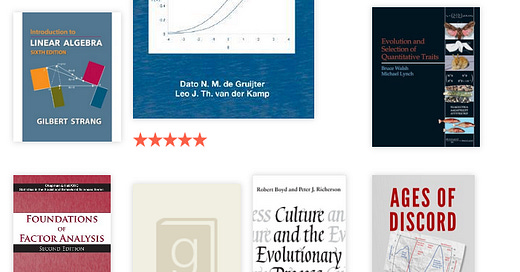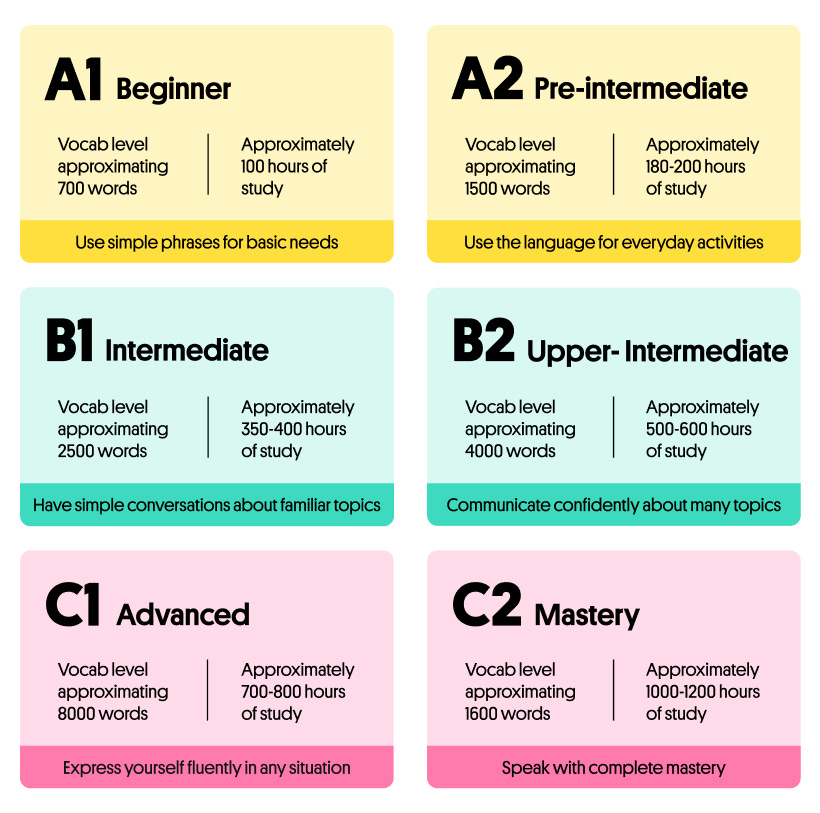I took my own advice from last year and cut my reading down a bit, from 22 to 20 books, and from 8200 pages to 6900. So, about a 10-15% drop. I also refined my reading to be more mathematical. I almost doubled my math reading, from 5 books to 9.
As usual my reviews are on Goodreads, so I won’t paste them here. Instead, I’ll classify my reading and comment on my broad take-aways.
Math
Strang’s Linear Algebra — I never took linear algebra in university, and I had only read Axler’s proofs driven book, so I wanted a more practical, computational view, which is important in a lot of statistics texts.
Foundations of Factor Analysis — some interesting methods but mostly convinced me you should just use PCA. PCA is only a rotation of the data while other factor analysis methods arbitrarily find other solutions.
Evolution and Selection of Quantitative Traits — a decent overview of population genetics, mostly talks about drift but has some interesting comments on the breeder’s equation, mostly revolving around drift and fitness-environment correlation. Overall convinced me that population genetics (mathematical modeling of the single allele) is not super important for quantitative genetics (the effect of the whole genome on phenotype).
Culture and the Evolutionary Process — a lot of math but laughable science. A lot of time wasted on doing population genetics for culture instead of quantitative genetics for culture. Also a flawed notion of what a culturelle is, it’s defined still as a whole behavior itself instead of knowledge about behavior that then mixes with genes and environment to produce behavioral phenotype.
Ages of Discord — applies differential equations to a non-genetic generational cycle of violence. Very good read and I incorporated it into my elite theory models in the last chapter of QSB.
Statistical Test Theory — very good mathematical introduction to psychometric theory. I used it to argue that lower h^2 for IQ in GWAS compared to height are probably just because of low IQ test reliability. It also helped me improve my procedure for estimating true g from a set of IQ scores for an individual. It’s also useful for creating and evaluating new psychometric constructs.
Elements of Information Theory — side reading, not really that useful for me, but you hear the concept of “entropy” thrown around in the Discourse^TM occasionally. This book is basically about the meaning of entropy, where other sources present it only computationally. The book proves that entropy is equivalent to the average number of binary questions you must ask in order to ascertain the result of a random experiment. This is the same as the average length of the bit string needed to describe the result. So they say leftism is “entropy” in the Discourse — how so? How did leftism increase the amount of information needed to describe anything? (and yes this is the same entropy as the one from physics, just considered abstractly. In physics it simply describes how systems are probabilistically branching — as time goes by the number of possible states given the initial increases, so the entropy of the state variable goes up).
Generalized Linear Mixed Models — read to understand BLUP. Not very useful so far except for that post but it was a decent introduction to PhD level statistics. Up until this point I basically read at the advanced undergraduate level. It helped convince me to make this year’s reading list the statistics PhD core, because I don’t want to be barred from properly understanding advanced books on applications. I would also like to produce new methods and properly analyze existing methods in behavior science, like BLUP, APC analysis, and so on.
Variance Components — I learned to avoid the lead author’s writings even though he is highly cited. More on this here. If you mostly read 21st century sources this doesn’t matter as he mostly wrote in the late 20th century.
Eugenics
Essays in Eugenics — main take away is that Galton already knew a lot of stuff that behavior scientists and even biologists have still mostly forgotten. He basically understood polygenic selection which is still denied and misunderstood to this day. It feels like a cutting edge thing but it’s really 200 years old and nobody will listen.
Eugenics by Lynn — I mostly remember it for his discussion contra the myth that “eugenics fell because of the Nazis.” Lynn shows that the US and other European countries had more sterilizations than Germany. Decent account of the history of eugenics with good analysis.
Eugenics and the Nature-Nurture Debate — has more details than Lynn and goes back further, but worse analysis, especially regarding the Nazi myth. An entertaining read about academic drama. Does a lot to show how biased an unscientific anti-eugenics activists were and are.
Woke Eugenics — Discusses spiteful mutant theory and the idea that woke, through social epistasis amplification (SEA), is bringing about higher selection pressures favoring conservatives. In other words, there is a memetic component to wokeness that spiteful mutants are predisposed to, and it lowers their fertility more than genes alone would, leaving those who are resistant to woke to breed a lot more than the woke, thus resolving the woke crisis far quicker than without SEA. I don’t know if I fully agree with the optimistic thesis, but it is interesting and packed with good, data driven sources, and is worth reading. It’s easily the best popular piece on the “origins of woke” and it’s ridiculous that it was ignored here, for instance.
Historical
Mind at the End of its Tether — HG Wells predicted the decline of civilization, but he was also probably having mental issues due to old age and impending death. Very short and historically interesting due to its author and the book’s age.
The Real North Korea — an extended description of maybe the craziest society in the world. I tried to analyze it sociobiologically here. I think this made more sense than the usual explanations.
Slop
The Anxious Generation — maybe the only book I gave a rating of “F” to this year. Wrong thesis, lacking evidence — don’t bother reading. The real stuff is on Haidt’s substack and in journal articles. This 350 page book is literally missing key evidence that is given in short articles. I guess Haidt thought the masses would be too dumb for real data? Should probably be a crime to have purposeful omissions in a book like this just so you can try to rile up the mob into banning phones when you are probably wrong. It’s purposeful deception. What I took away from it was having for less respect for the author than I did before, due to The Righteous Mind. What happened? More here.
The Genetics of Political Behavior — kind of funny, says things like liberals come from “Obama Island.” But not really scientific, it’s missing citations and the author doesn’t get evolution very well. It still says politics is mostly genetics and was entertaining, so it’s slop but not as bad as The Anxious Generation.
Left & Right — atrocious book written by a leftist who for the life of him can’t understand rightists. Imagine the dumbest strawman possible from a sociology professor of what conservatism is, scientifically speaking. This book might be worse than that. Maybe it should also have an F rating? It can squeak out with a D because it was somewhat data dense.
German
German: How to Speak it and Write It — good grammar book, but it taught me to not use grammar books when learning a language. Just do listening integrated Anki (more on this below), and watch Youtube videos on grammar if you get confused! More than a few days worth of grammar is never the barrier between understanding and being understood — it’s always accent comprehension (listening) and vocabulary (reading) instead.
I spent a lot of time this year doing non-reading intellectual activities, one of which was learning about 4,000 words of German, which puts me at about B2.
But I did this with no books, only Anki and listening sources. I also upgraded my webshit skills. I did this in part by making an app to streamline listening integrated Anki.
It works by auto translating a word you hear into an Anki card:
The card has audio and an image, and 3 example sentences.
You can upload it to your Anki deck with a single click and sync your collection, and then download the card on, e.g. your phone using the built in Anki sync button.
I’m going to release it this year for public use, which brings me to my intellectual New Year’s Resolutions:
Release the Anki plugin
Reach C1 in German (learn at least 4000 more words)
Read Statistical Inference, Analysis I & II, Probability and Measure, Asymptotic Statistics, and High-Dimensional Statistics.
I don’t have any explicit writing goals — I think I’ve mostly done everything I can do at my current skill level that is worth doing in writing, so I’ll focus on building and learning this year instead. I’ll still write plenty — hopefully I have a lot of new ideas that spring up along the way, similar to the BLUP article.










If you want more on the history of academic drama, this one is decent: Defenders of the Truth: The Sociobiology Debate.
I’ll gladly volunteer to be a Beta tester for your Anki plug-in! And Happy New Year!